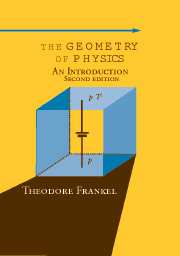Book contents
- Frontmatter
- Contents
- Preface to the Second Edition
- Preface to the Revised Printing
- Preface to the First Edition
- I Manifolds, Tensors, and Exterior Forms
- 1 Manifolds and Vector Fields
- 2 Tensors and Exterior Forms
- 3 Integration of Differential Forms
- 4 The Lie Derivative
- 5 The Poincaré Lemma and Potentials
- 6 Holonomic and Nonholonomic Constraints
- II Geometry and Topology
- III Lie Groups, Bundles, and Chern Forms
- Appendix A Forms in Continuum Mechanics
- Appendix B Harmonic Chains and Kirchhoff's Circuit Laws
- Appendix C Symmetries, Quarks, and Meson Masses
- Appendix D Representations and Hyperelastic Bodies
- Appendix E Orbits and Morse–Bott Theory in Compact Lie Groups
- References
- Index
2 - Tensors and Exterior Forms
Published online by Cambridge University Press: 05 June 2012
- Frontmatter
- Contents
- Preface to the Second Edition
- Preface to the Revised Printing
- Preface to the First Edition
- I Manifolds, Tensors, and Exterior Forms
- 1 Manifolds and Vector Fields
- 2 Tensors and Exterior Forms
- 3 Integration of Differential Forms
- 4 The Lie Derivative
- 5 The Poincaré Lemma and Potentials
- 6 Holonomic and Nonholonomic Constraints
- II Geometry and Topology
- III Lie Groups, Bundles, and Chern Forms
- Appendix A Forms in Continuum Mechanics
- Appendix B Harmonic Chains and Kirchhoff's Circuit Laws
- Appendix C Symmetries, Quarks, and Meson Masses
- Appendix D Representations and Hyperelastic Bodies
- Appendix E Orbits and Morse–Bott Theory in Compact Lie Groups
- References
- Index
Summary
In Section 1.4b we considered the n-tuple of partial derivatives of a single function ∂F/∂xj and we noticed that this n-tuple does not transform in the same way as the n-tuple of components of a vector. These components ∂F/∂xj transform as a new type of “vector.” In this chapter we shall talk of the general notion of “tensor” that will include both notions of vector and a whole class of objects characterized by a transformation law generalizing 1.6. We shall, however, strive to define these objects and operations on them “intrinsically,” that is, in a basis-free fashion. We shall also be very careful in our use of sub- and superscripts when we express components in terms of bases; the notation is designed to help us recognize intrinsic quantities when they are presented in component form and to help prevent us from making blatant errors.
Covectors and Riemannian Metrics
How do we find the curves of steepest ascent?
Linear Functionals and the Dual Space
Let E be a real vector space. Although for some purposes E may be infinite-dimensional, we are mainly concerned with the finite-dimensional case. Although ℝn as the space of real n-tuples (x1, …, xn), comes equipped with a distinguished basis (1, 0, 0, …, 0)T, …, the general n-dimensional vector space E has no basis prescribed.
Information
- Type
- Chapter
- Information
- The Geometry of PhysicsAn Introduction, pp. 37 - 94Publisher: Cambridge University PressPrint publication year: 2003
